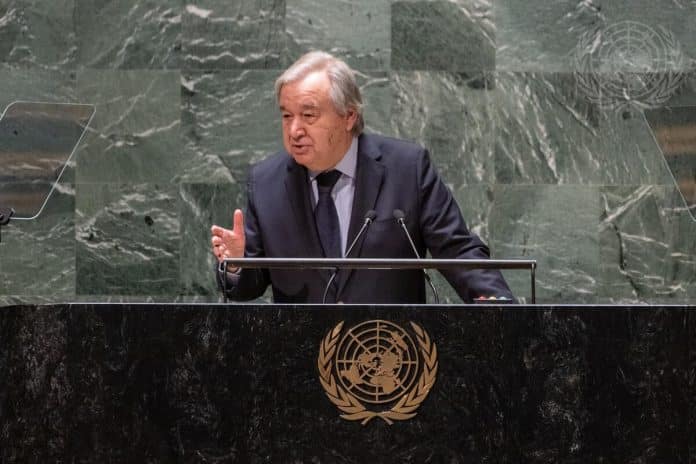THE SECRETARY-GENERAL
G20 PRESS CONFERENCE
New Delhi, 8 September 2023
Ladies and gentlemen of the media, very good evening.
It is a great pleasure to be back in India for this pivotal G20 summit.
Let me begin by expressing my gratitude to India for the warm welcome – and my hope that India’s presidency of the G20 will help lead to the kind of transformative change our world so desperately needs, in line with the repeated commitment of India to act on the behalf of global South and its determination to pursue the development agenda.
And I welcome the focus on One Earth, One Family, One Future.
This phrase inspired by the Maha Upanishad finds profound resonance in today’s world: not just as a timeless ideal – but as an indictment of our times.
Because if we are indeed one global family – we today resemble a rather dysfunctional one.
Divisions are growing, tensions are flaring up, and trust is eroding – which together raise the spectre of fragmentation, and ultimately, confrontation.
This fracturing would be deeply concerning in the best of times – but in our times, it spells catastrophe.
Our world is in a difficult moment of transition. The future is multipolar – but our multilateral institutions reflect a bygone age.
The global financial architecture is outdated, dysfunctional, and unfair. It requires deep, structural reform. And the same can be said about the United Nations Security Council.
We need effective international institutions rooted in 21st century realities and based on the UN Charter and international law.
That is why I have been advocating for bold steps to make those global institutions truly universal and representative of today’s realities, and more responsive to the needs of developing economies.
We have no time to lose.
Challenges stretch as far as the eye can see.
The climate crisis is worsening dramatically – but the collective response is lacking in ambition, credibility, and urgency.
Wars and conflicts are multiplying – but efforts to advance peace are faltering.
New technologies are raising red flags – but actions to contain the risks remain too slow, and too piecemeal.
Poverty, hunger, and inequalities are growing – but global solidarity is missing in action.
I have come to the G20 with a simple but urgent appeal: we cannot go on like this. We must come together and act together for the common good.
G20 leaders must show leadership in two priority areas.
First, leadership on climate.
The climate crisis is spiralling out of control.
But G20 countries are in control.
Together, G20 countries are responsible for 80 per cent of global emissions.
Half-measures will not prevent full climate breakdown.
Leadership means:
Keeping the 1.5 degree goal alive.
Rebuilding trust based on climate justice.
And advancing a just and equitable transition to a green economy.
I have put forward a Climate Solidarity Pact – in which big emitters make extra efforts to cut emissions; and wealthier countries support emerging economies to achieve this.
And earlier this year, I presented a plan to super-charge these efforts through an Acceleration Agenda.
It calls on developed countries to reach net-zero as close as possible to 2040, and emerging economies as close as possible to 2050.
Phase out coal by 2030 in OECD countries and 2040 in all others.
End all licensing or funding of new fossil fuel projects.
And bring affordable electricity to everyone on earth while simultaneously reaching net-zero electricity by 2035 in developed countries and 2040 elsewhere.
Leadership also means finally delivering on commitments to developing countries – by the developed world, including by meeting the $100 billion goal, doubling adaptation finance, replenishing the Green Climate Fund, and operationalizing the loss and damage fund created in the last COP.
Ladies and gentlemen of the media,
Second, the G20 must show leadership in saving the Sustainable Development Goals.
I have put forward concrete measures that would yield immediate benefits.
They include:
An SDG Stimulus of at least $500 billion per year.
An effective debt workout mechanism to support payment suspensions, longer lending terms and lower rates on fairer terms to developing countries in distress.
A meaningful capitalization and change in the business model of Multilateral Development Banks to be able to massively leverage private finance at reasonable cost to developing countries.
A more substantive rechannelling of unused Special Drawing Rights to increase liquidity where it is needed most.
And a shift in subsidies – away from fossil fuel to more sustainable and productive uses.
Together, these actions would catalyse SDG progress and help developing economies invest in key transitions across energy, food systems, digital, education, health, decent jobs and social protection.
All of this is within reach – but it will take all hands.
No nation, no region, no group – not even the G20 – can do it alone.
We must act together as one family to save our one earth and safeguard our one future.
Thank you.

